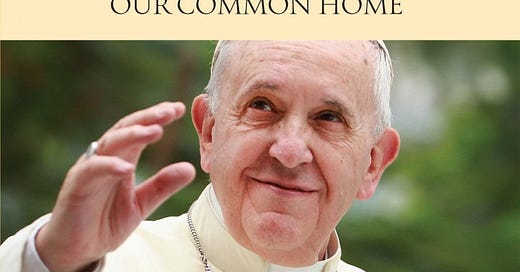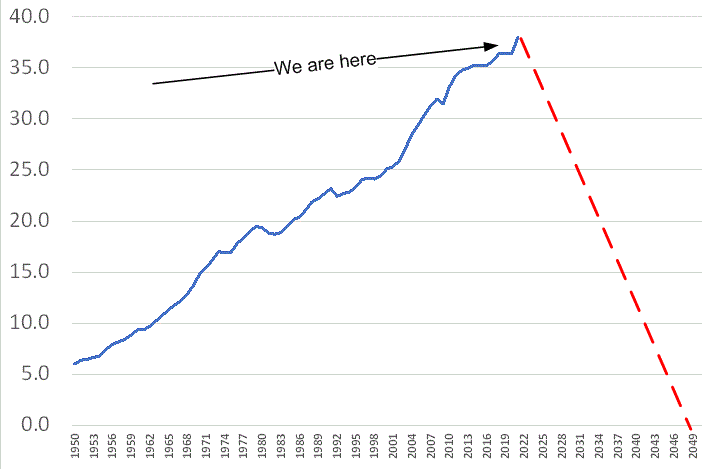A theme of this site is that the multiple crises we face provide an opportunity for the faith community to provide badly needed leadership. But this means that we need a theology that is fit for our times. With this thought in mind, I suggest the following three guidelines. I hope that professional theologians, seminarians and ordained clergy may find them useful. They are,
1. Understand physical realities
2. Accept and adapt
3. Live within Gaia
I have emphasized the second of the items in this list because it the most relevant to the contents of this post.
The Church Discussion Group
I recently participated in a church group that discussed the encyclical Laudato Sí (“Praise be to you”). The encyclical was published by Pope Francis and the Roman Catholic Church in the year 2015. It can be downloaded here.
In his encyclical, Francis goes beyond immediate concerns to do with climate change, which he identifies as a consequence of our consumer culture.
. . . a sober look at our world shows that the degree of human intervention, often in the service of business interests and consumerism, is actually making our earth less rich and beautiful, ever more limited and grey, even as technological advances and consumer goods continue to abound limitlessly. We seem to think that we can substitute an irreplaceable and irretrievable beauty with something which we have created ourselves.
Our discussions to do with this important document went well. However, a theme that kept cropping up was the need for a second edition. After all, the encyclical was published eight years ago, and much has happened since then.
But the need for a second edition goes beyond merely updating some of the information in the document. In our final discussion we faced the reality that when the encyclical was published it was received with considerable fanfare. But now its message seems to have faded; moreover, it seems to have had little impact on society overall, or even on many church activities. For example, carbon dioxide emissions continue their inexorable climb, as shown in the sketch (the red dashed line in the sketch represents the reduction in emissions needed to reach Net Zero by 2050.)
If the Roman Catholic church were to issue a second edition of Laudato Sí it would need to address the reality that the first edition has not had the impact that so many people anticipated and hoped for.
Overshoot
This failure to live up to expectations in a feature of much literature on these topics in recent years. For example, George Mobus wrote excellent blog posts on the crises we face. But he concluded,
I honestly did not expect to be a witness to the end of civilization when I started blogging those many years ago. Though I thought I could clearly see where the trends (energy, climate, social) were heading and tried to lay out the arguments for why we needed to change our ways, I thought that the really bad outcomes would post-date my life. I grieved for my children, of course. But never really thought I would be witness to the end game itself.
Now I’m not so sure. In fact I think that recent developments in climate science, energy science, and political science make it clear that we have entered the end game already . . . We will not be able to save civilization as we know it by any kind of technological magic. The rate of onset of climate change (notice the weather anomalies of late?) and the catastrophic collapse of fossil fuel energies (fracked wells are falling in production as we speak) not to mention the collapse of fisheries, soil depletions, and the insane left-vs-right political strife all mark the clear signatures of collapse, but this time on a global scale.
I’m calling the game over. I just cannot see a solution that has humanity going on in any kind of lifestyle that we have grown accustomed to in the 21st century.
My advice is head for the hills . . . And, good luck.
Comments such as the above are, we hope, hyperbole. Yet one of the most important writers on these topics was William Catton (1926-2015). He had a similar message toward the end of his life. His first non-academic book was Overshoot, published in the year 2009. The following is a key quotation from that book,
When the earth's deposits of fossil fuels and mineral resources were being laid down, Homo sapiens had not yet been prepared by evolution to take advantage of them. As soon as technology made it possible for mankind to do so, people eagerly (and without foreseeing the ultimate consequences) shifted to a high-energy way of life. Man became, in effect, a detritivore, Homo colossus. Our species bloomed, and now we must expect a crash (of some sort) as the natural sequel.
Climate change is not our biggest problem; overshoot is. Global warming is but a symptom of ecological overshoot.
He hoped that his message would lead to a change in our trajectory.
His second book — Bottleneck: Humanity’s Impending Impasse — was published in the year 2009. By then he had given up on easy optimism.
I hope by the time [my great-grandsons] become great-grandfathers themselves, their generation will be so conspicuously more enlightened than mine was and our forebears were that the world population of bottleneck survivors will have evolved social systems better able to be circumspect in the use of their planet and its vulnerable biosphere. If readers of this book come to share similar hopes, and contribute to instilling them in their descendants, my reasons for writing will have been justified.
He chose not to end his second book with the traditional ‘Happy Chapter’.
If Pope Francis and his church do decide to issue a second edition of Laudato Sí he will need to address the reality of our inadequate responses to date. If he does so then the church is, in my opinion, positioned to provide badly needed leadership to society as a whole.
The Second Guideline
We started this post by listing three guidelines that may be helpful in developing a theology that is appropriate for our times. The discussion in this post relates to the second of these guidelines: ‘Accept and adapt’. In Laudato Si Pope Francis stresses the ‘Accept’ theme. We need to stop wishful thinking — we need to accept the damage that we are doing to the planet. His approach to adaptation may, however, be less convincing. Writers such as Mobus and Catton have carefully analyzed our current predicaments, and have come up with the conclusion that we are heading toward a bottleneck. Adaptation may be less pleasant than many environmentalists anticipate.






